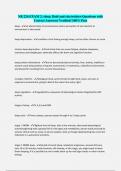NR 226 EXAM 2: sleep, fluid and electrolytes -Questions with Correct Answers/ Verified/ 100% Pass sleep - ✔✔an altered state of consciousness where perception of and reaction to environ ment is decreased sleep deprivation - ✔✔condition of not having enough sleep, can be either chronic or acute chronic sleep deprivation - ✔✔restricted state can cause fatigue, daytime sleepiness, clumsiness and weight gain, adversely affects the brain and cognitive function sleep pattern disturbance - ✔✔due to decreased physical activity, fear, anxiety, inability to assume usual sleep position, frequent assessments or treatments, unfamiliar environment, and discomfort resulting from current illness/injury circadian rhythms - ✔✔biological clock, synchronized to light -dark cycles, and cues in organisms environment, going to bed at the same time every night sleep regulation - ✔✔regulated by a sequence of physiological states integrated by CNS activity stages of sleep - ✔✔1,2,3,4 and REM sleep cycle - ✔✔once asleep a person passes through 4 to 5 sleep cycles stage 1: NREM - ✔✔lightest level of sleep, lasts a few minutes, decreased physiological activity beginning with a gradual fall in vital signs and metabolism, person easily aroused by sensory stimuli such as noise, in person awakes, feels as though daydreaming has occurred, reduction in a autonomic activities, stage 2: NREM sleep - ✔✔period of sound sleep, relaxation progresses, arousal still easy, lasts 10 to 20 minutes, body functions still slowing, at this stage, you might want to leave them sleeping, if it is possible try not to wake them up for vital sign checks or other routine testing stage 3: NREM - ✔✔initial stages of deep sleep, sleeper di fficult to arouse and rarely moves, muscles completely relaxed, vital signs decline but remain regular, lasts 15 to 30 minutes, hormonal response includes secretion of growth hormone (especially in children in stage 3 &4) stage 4: NREM - ✔✔deepest stage o f sleep, very difficult to arouse sleeper, if sleep loss has occurred, sleeper will spend considerable portion of night in this stage, VS are significantly lower than during waking hours, stage last approx. 15 -30 minutes, sleepwalking and enuresis sometime s occur REM sleep - ✔✔stage of vivid, full -color dreaming, first occurs approx, 90 minutes after sleep has begun, thereafter occurs at end of each NREM cycle, typified by autonomic response of rapidly moving eyes, fluctuating heart and respiratory rates, and increased fluctuating blood pressure, loss of skeletal muscle tone, responsible for mental restoration, stage in which sleeper is most difficult to arouse, duration of REM sleep increases with each cycle and averages 20 minutes functions of sleep - ✔✔restores normal levels of activity, restores normal balance among parts of the nervous system, necessary for protein synthesis (energy for body and muscle growth), psychological well -being , dreams purpose of sleep - ✔✔physiological and psychological rest oration and maintenance of biological functions dreams - ✔✔occur in NREM and REM sleep and important for learning, memory and adaptation to stress physical illiness - ✔✔cardiac, respiratory, pain, sleep disorders (BOX 42 -3), classification of select diso rders select disorders - ✔✔insomnia's, sleep apnea, narcolepsy, parasomnias (talking), sleep deprivation vs. alteration in sleep (nursing student), sleep related movement disorders, see box 42 -3 sleep disorders in clients with coronary artery disease




